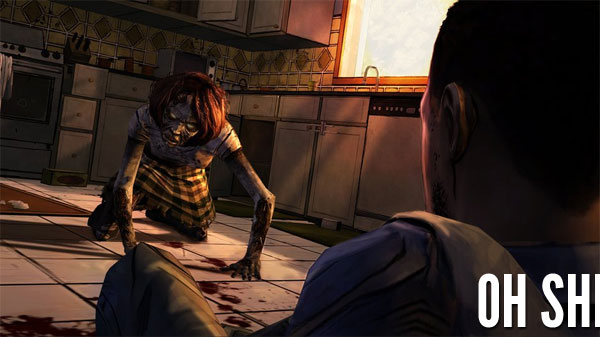Doubt in the Time of Zombies
Two kinds of people walk free from the burden of doubt: Ryan Gosling and children. Gosling because, well, whatever, he’s Ryan Gosling. Children because they don’t think; they just believe. They are the perfect representation of life in an ideal world of black and white, right and wrong, life and death. If you give them a reason to believe, they surpass any level of faith and take to it as if it were simply knowledge, facts that anyone could look up and tell you that yes, you are right.
It’s not that children think that there’s a monster under their bed because that would be ridiculous. Why worry about something that isn’t there? No, they absolutely, 100% know that there is a hairy, snarling, drooling, fanged beast hiding just inches beneath them. They know that it’s waiting for them to fall asleep so it can take them away to the darkness and gobble them up.
But they also know that you can make it all better. They know monster won’t attack the one person in the world who promised to protect them. They know that their ratty old blanket is actually an impenetrable armor and as long as it’s with them, nothing bad can happen. They know all these things because they are not a question of believing and not believing but a matter of crystal clear facts, regardless of truth.
Little Clementine, a young 8-year-old girl Lee Everett finds hiding in a tree house soon after the dead learn to walk, isn’t afraid. She’s been up in that tree, hiding and staying quiet, for days now. The only thing she has with her is a walkie-talkie, and that’s how she knows it’s going to be okay. She’s not wondering if her parents are alive; she’s waiting for them to come home, to hold her in their arms and tell her everything is going to be all right. That walkie-talkie is going to crackle and sputter the words “Clementine, we’re coming home,” and no way is she going to leave that behind for anything.
The problem for Lee, then, is two-fold: he’s not a child nor is he Ryan Gosling. Pragmatically, he has to assume Clementine’s parents are dead (given the macabre voicemails) and that this little girl won’t survive without him, so he takes her under his wing, but says nothing about his assumptions regarding her parents. He knows that if you tell a child something, it doesn’t plant little seeds of doubt or inspire bouts of rabid hope. No, you will either shatter their world, demolishing the very bridge they’re walking on, or you rebuild the ramparts. So instead, Lee just promises to watch out for her until they find her parents.
It’s unfortunate, as anyone who has tried to protect someone (from the dark unknown, a shifty stranger, or just the saddening pits of loneliness) before knows, that the burden becomes yours. But it’s not a linear progression, problems simply adding up like a to-do list. These issues compound exponentially, and you are soon faced with the choices that, once simple, are now infinitely more complex. And as this clarity slowly wanders out of view, you can see the toll it takes on Lee as he encounters other survivors. You can see how he attempts to keep a scattered array of pushpins and thread sorted in his mind, how the gravity of his and her collective situation begin to weigh him down to the point of immobility. He can’t make a move because any move is going to be the wrong move, and yet standing there doing nothing could be the worst move of all, but he’ll never know.
Because you’ll never know. All these things going through Lee’s mind are also rattling around yours. In these moments where time actively and visibly passes, you shove out of your thoughts the fact that you haven’t paid your bills or that the person you met at the bar never called you back and you suddenly become enveloped in the stench of the sort of responsibility you only face in a world of undead.
Journey was a distillation of a personal relationship, its base components revealed through limited interaction. A New Day, the first episode of The Walking Dead video game, is society boiled down to its fundamental parts: action and reaction. Everything you or anyone else does is at the expense of your time, the most primary and essential resource, and forces an economy of your seconds, minutes, and hours to attain an ultimate end. But for every expense, you accrue doubt: self-doubt, doubt from others, and a general lack of faith and confidence. Was that the right move to protect Clementine? Is this the wrong bridge to burn? To what end am I expending my only and most precious resource?
I bet Ryan Gosling doesn’t have these problems.
